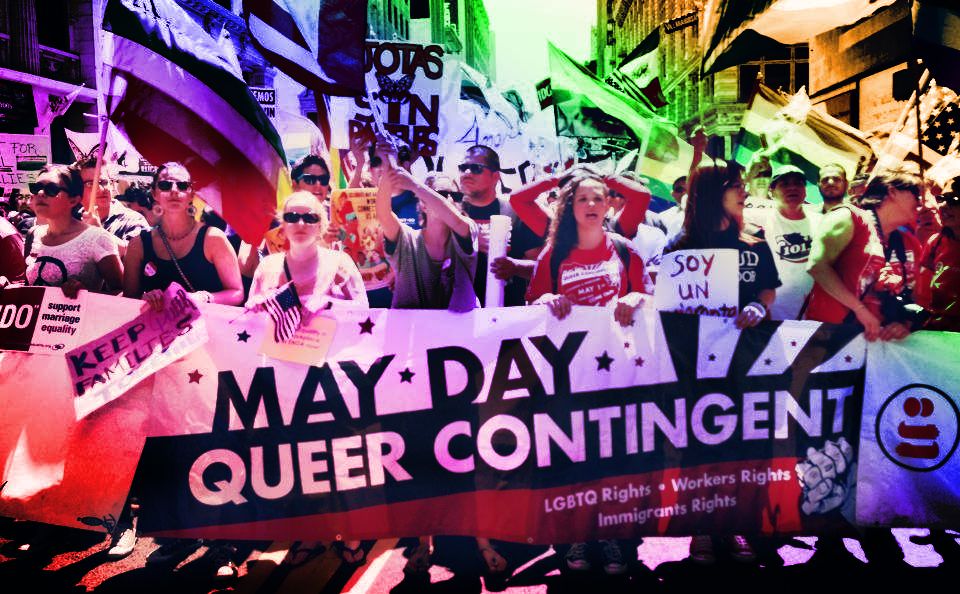
The following article appears as a chapter in the 2012 anthology Queering Anarchism: Addressing and Undressing Power and Desire edited by C.B. Daring, J. Rogue, Deric Shannon, and Abbey Volcano and takes up themes of radical queer politics and anti-capitalism. We are reminded of the quote by French libertarian communist figure Daniel Guérin (1904-1988): “If socialism is not to be a caricature of itself, we, as homosexuals, have a role to play in the class struggle.”
By Gayge Operaista
While radical queers identifying with anarchism, anti-authoritarianism, and/or anticapitalism seem to be on the upswing, there exists a profound misunderstanding of class struggle within radical queer circles and a lack of class analysis that hurts both specifically queer analyses and anticapitalism as a whole. Let’s face it, the task is not to “queer” anarchism, which has become a signifier for every countercultural, edgy activist project out there, to the point where it now has as little shared meaning among radicals as queer does in the radical milieu. The task is for radical queers to become class struggle militants. We need to be constantly conscious of moving toward a holistic queer praxis, one that examines the conditions of the lives of all queers, and also that locates those lives in the larger context of the struggles of all workers and all the oppressed. This is not only a position of solidarity and a refusal to leave other queers behind, but it is also the realization that queer liberation is inextricably tied with the self-emancipation of the working class.
Queers, like other oppressed groups, are hit particularly hard by capitalism, and this is especially true of the queers most often erased, ignored, or left behind by queer and feminist movements: queers of color, trans and gender-nonconforming people, queers with disabilities; and queer sex workers are some examples. Many queer anarchists and other anticapitalists come from anti-oppression backgrounds, and, while analysis in anti-oppression circles continues to improve and greater understandings and explications of intersectionality continue to be the case in those circles, a good, critical anti-oppression analysis is not enough. We need to be both anticapitalists and to understand how capitalism functions to truly understand the conditions of the lives of the working class, from those struggling against multiple systems of oppression to the “middle class” existing in a position of (far too often temporary) comfort in the suburbs. Through this understanding of class struggle, we can contribute to mass movements for collective liberation.
Without this understanding of class struggle, our critique of the state can only be both flawed and limited; we must have an understanding of class struggle to see the state as an instrument of the domination of one class over all other classes and our anti-state project as the need to destroy the bourgeois state as inseparable from the project of abolishing all classes. It is a social and not an antisocial project. To paraphrase Kropotkin, we want no rulers, not no rules, and failing to acknowledge class struggle leads to a view of the state as an independent institution, not as an instrument of class rule. Also this can lead to a glorification of antisocial acts as some sort of resistance to the state, when in reality they are juvenile, futile, and reactionary. Unlike Leninists, we neither want to seize the state nor even to replace it with a “proletarian” state. We know that if classes remain after the revolution, and there is the need for a hegemonic governing body separate from the people to maintain social relations, then the revolution has failed.
However, many queers come to anticapitalist movements retaining liberal ideas about class and how capitalism functions, treating class as just another way someone can be oppressed or privileged, rather than a relationship to the means of production that is continually re-created. Applying an antioppression analysis to class becomes problematic in many ways. It causes us to continue to use the definitions of class that the bourgeoisie (capitalist class) use for us, that serves to split the working class and convince members of it to act against their own class interests. It prevents us from articulating how and why some queers are hit so hard by capitalism, and results in us far too often ignoring the struggles of trans people, for instance, and rephrasing them in terms of people being voluntary “drop outs,” as if the state of being “middle class” was an immutable, inherited thing rather than a term created to get portions of the working class to side with capital against other workers.
The solution to these issues, of course, is educating ourselves about class struggle, and capitalism, and to see the movement for queer liberation as both indispensably a part of the struggle of the working class and indispensable to that struggle.
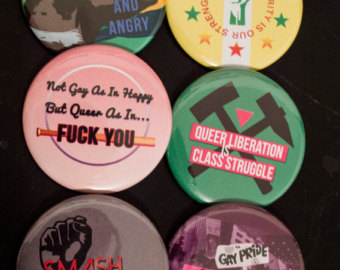
On “Classism”
A standard practice from anti-oppression circles is writing a list of oppressions that we oppose, and oftentimes “classism” is included in that list. Leaving aside the fact that the lists are, by necessity, incomplete, capitalism is a structure of a different sort from white supremacy or heteropatriarchy, for instance. We do not seek to cease to engage in practices we currently call queer in undoing heteropatriarchy; however, the goal of anticapitalist struggle must be the negation of first the capitalist class (through seizing the means of production), and the subsequent negation of the working class, as the exploitation of labor ends with control over both one’s labor and the necessities of life, the abolition of property, and the socialization of the means of production. To struggle for any less than this is to struggle only against class elitism, to merely want the rich to treat us better, for the lives of the poor to not be so hard. This is not the sum of our desires. We want a world without rich and poor, and it’s time our analysis, our organizing, and our actions reflected that!
Furthermore, due to the analysis of class carried over from liberal or reformist analyses, there is the tendency to use accusations of classism to maintain divisions within the working class, to silence, erase, or render the marginalized powerless, and to invisibilize a wide variety of the experiences of queer people. And these all draw upon flawed analyses of class. The post–World War II restructuring of the working class, particularly in the post-industrial world, has lead to ever greater levels of education in the working class, and greater employment in the service sector and technical jobs. Meanwhile, many stereotypical assembly-line jobs have moved to the developing world or been replaced by machines. Not only do sociological definitions of class that are based on old stereotypes about education and work performed conceal social relations, they obscure the reality of the proletariat in the post-industrial world. Furthermore, presumptions about who is a “true prole” and what “true proles” are intellectually capable of both insult those who do blue-collar work, and serve to either implant anti-intellectualism into mass movements or to maintain intellectual labor as the specialized domain of academics. Also, with the increasing privatization of education and the rapidly rising costs of both public and private higher education, student debt is becoming an increasingly large factor in proletarian struggle, and pretending that a mythical “middle class” exists, composed of everyone outside the increasingly scarce assembly-line worker, cuts us off from a variety of important terrains of struggle. Too often, our discussions of class turn into a competition over whose childhood was harder rather than figuring out how we’re going to liberate ourselves. And while there are real socioeconomic differences between various groups within the working class, we cannot let that obscure our analysis of the class as a whole.
To overcome this infighting, flawed analysis, and erasure, we need a truly anticapitalist analysis of class. We need to understand capitalism as creating a class system based on relationship to the means of production, and understand that an essential component of working-class struggle on the way to destroying capitalism is to win day-to-day struggles, such as less hours, greater pay, safer and more comfortable work environments, in so much as those things reduce the amount of value the capitalist class extracts from us and can be won directly, without mediation. Another goal of day-to-day struggle is to create and maintain effective self-organization. Winning these intermediate struggles does not take workers out of the working class, and can (and must, if we, the working class, are to liberate ourselves) serve both to improve the conditions we are struggling from and also build our capacity and ability to struggle by encouraging our self-organization as a class. It is foolish to buy into the same logic that the capitalist class uses to divide us against ourselves.
Another flaw of this sociological/liberal analysis of class as just another oppression is that it is the first step in breaking our solidarity with the entire proletariat. When we view class as a way that the poor are oppressed and that the so-called middle class and the capitalists are privileged (with the capitalists merely more privileged than the middle class), we inevitably fall into arguments of who is “working class enough”; did the queer who grew up in a single-parent home in poverty cease to be working class when she worked her way through school and became a teacher? Is the struggle of a trans person who is unable to get steady work under capitalism illegitimate due to the fact that they grew up in a two-parent household in the suburbs? Do we write off cis straight white workers due to their being “too privileged” to be in the same struggle as us? Do white queers continue to fetishize people of color, conflating race with class, without an analysis of how capitalism constructed and maintains racism? We cannot resolve these questions within queer anarchist circles while retaining an analysis of class drawn from an anti-oppression politics grounded in sociology or liberalism.
The most serious flaw, however, by putting class merely on the level of an oppression, is failing to have the realization, to paraphrase Marx, that the workers are the ones with radical chains; the exploitation of the working class is the entire basis of the system we want to destroy, and it is only by identifying, struggling against, and destroying those chains that any of us can be liberated. Once we realize that we can begin to understand how stratification based on race, gender, and sexuality were built into the working class as a means of control and hyperexploitation and as the midwife to capitalism’s birth.
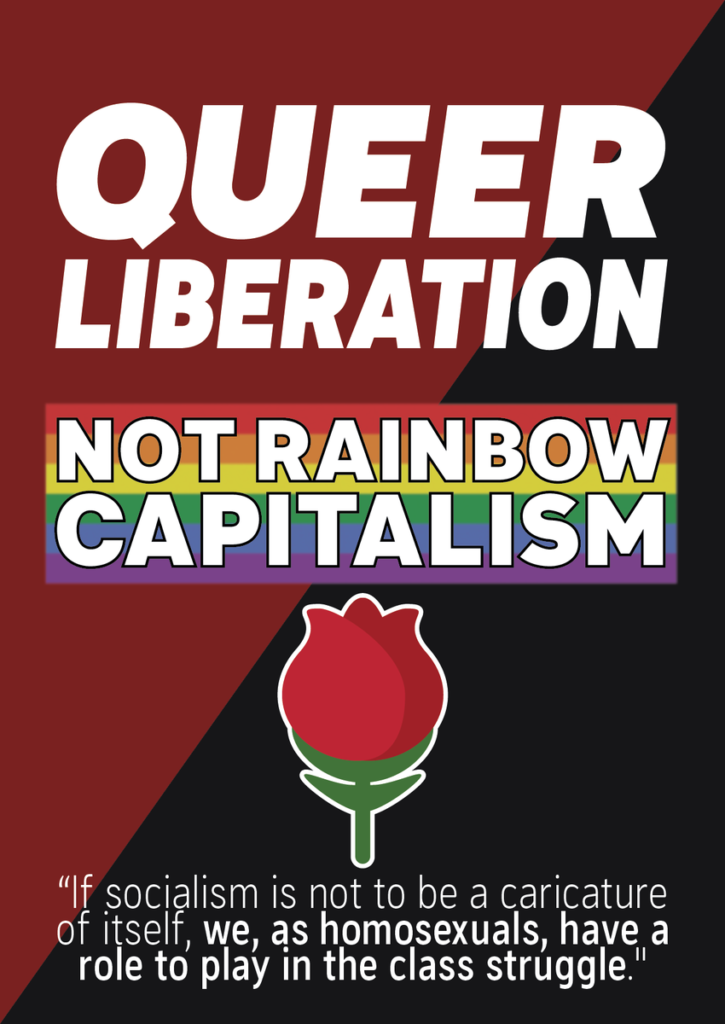
Beyond the Limits of Identity Politics
“Queer” arose as a critique of the assumptions that underlie identity politics. These assumptions were that oppressed groups were well-defined, had clear borders, that all members of the oppressed group have common desires and needs, and that a small portion of that group could thus speak for the entirety of the group. “Queer” was purposefully reclaimed to be a term of solidarity and struggle, and to include gay, lesbian, bi/pansexual people, and trans and other gender-nonconforming people. Initially, there was the acknowledgment that these groups had different desires and needs, but formed a coalition uniting around oppression based on gender and sexuality. However, queer liberation movements remaining rooted in identity politics have led us down the road of debating the precise boundaries of queer and arguing over whose concerns are legitimate, all the while pretending that we were not participating in identity politics, and thus can ignore the very real power differentials that occur within the queer community. To break away from the negative aspects of identity politics, we must look at material conditions and specific effects on particular subgroups, and struggle from those material conditions.
Furthermore, by defining a common struggle only along the lines of queerness, we are faced with the question of whether we want to organize for the same struggles as bourgeois queers. While queer anarchist/anti-authoritarian/anticapitalist circles make a big point of espousing “anti-assimilationism” and anticapitalism, often the analysis deteriorates into “being like the straights is bad” and “capitalism is bad.” By generalizing “the straights” as a coherent group that hegemonically oppresses “the queers,” and that the reason we don’t want to assimilate is because we don’t want to be like them, it becomes both too easy for us to ignore struggles that do not directly touch the entire queer community and to reduce anti-assimilation into nothing but a way to police the desires and identities of other queers.
We need to oppose the institution of state-sanctioned marriage because it strengthens the nuclear family as the consumptive and reproductive unit of capitalism, not because many straight people get married. Trying to invert the relationship hierarchy to shame people who are happy with a long-term relationship and shared household with a partner does not bring us a step closer to ending capitalism and ending oppression. It merely is one method by which queers police the identities, expressions, and ways of life of people in our community. If anti-assimilation is to be of any value, it needs to be founded on the idea that we want to destroy the current order and help build a better world, not keep ourselves separate from “the straights” because queers are somehow a well-defined group that do not find themselves as part of any other groups and can be kept apart from the rest of the world.
It is also necessary to keep in mind our class interests; no matter how well bourgeois queers play the part of a “radical” queerness, we can find nothing in common with their class interests, and are in struggle with them, and not the straight members of the working class. If we assume that our commonality lies in our queerness, not only can we be forced to ignore the other ways we are oppressed, we also assume that bourgeois queers are our allies and straight working-class people are our enemies, when we want only one thing from bourgeois queers—to take back that which is rightfully ours, and share it in common amongst ourselves according to our needs. This is the same thing we want from bourgeois straights and a desire we have in common with more and more straight members of the working class every time class recomposition occurs.
Without incorporating an analysis beyond identity, we are unable to go beyond the limitations of identity politics. While an understanding of intersectionality helps us to understand that some queers face issues that other queers do not, intersectionality is not enough, as it does not address the fact that the interests of bourgeois queers are in direct contradiction to the interests of the majority of queers, and this conflict can only be resolved through furthering class struggle, and ultimately by social revolution. We need to be wary of critiquing identity only to create a singular in-group and a singular out-group, and having the composition of that in-group have more to do with hipness and popularity rather than sexuality or gender. We also need to be wary of a politics that has us make alliances with the people in power rather than with members of other marginalized and exploited groups.
Struggling Autonomously, or, “Who is Queer, Anyway?”
It is often necessary for oppressed groups to engage in class struggle autonomously—i.e., to self-organize against their specific material conditions, fight against them, and bring their struggle back to the working class as a whole. While I am about as interested in arguing the precise definition of queer as I am about arguing about how many angels can have a circle jerk on the head of a pin, it’s pretty clear what queer in general is—the state of being not-heterosexual, and/or the state of being trans, genderqueer, or gender-nonconforming. This, in the main, is the definition that has been used for “queer,” as a reclaimed term of solidarity, by queer communities in struggle for decades. While “queer” is a purposefully imprecise term, we should avoid it becoming either a hip label or something that only belongs to those we agree with politically.
Working-class queer communities have often been targeted from both sides, first by bourgeois LGBT organizations looking for numbers and legitimacy, and by radical organizations that seek to coopt queers and queerness that they feel comfortable with. Both sides erase and silence the queers they are not comfortable with. Ultimately, working-class queers need the ability to self-organize, and to do that they need to not be controlled by either bourgeois LGBT organizations or radical organizations coming in from the outside to lead them. While of course there are radical working-class queers in radical organizations, working-class queer community organizations need to arise out of the self-organization of all working-class queers, and not exclude non-radicalized queers from membership, as people are radicalized through struggle, and excluding them from the organs of struggle is saying that we both know best and that they are beyond change.
While queer communities have often defined “queer” too narrowly—examples of excluded groups from dyke communities being bisexuals, femmes, butch/butch and femme/femme couples, butches and femmes at some points in time, and trans women—we need to not be so broad as to be meaningless; we need to retain a notion of queer that highlights the separation from traditional notions of the family, and the additional reproductive labor (in the sense of being able to reproduce one’s labor power for the next day) that comes from being a member of an oppressed group that is in constant danger from a hostile world and lacks traditional means of support.
If we want queers to be able to join in the broader class struggle (not like we haven’t been there all along), we need spaces and organizations where we can approach the class struggle from working-class queer standpoints. We need spaces where we can formulate the questions about what being a working-class queer means to our material conditions, to our exploitation under capitalism. To truly be able to do that we need spaces where we can form organizations that don’t need to make every hetero radical comfortable, and spaces that aren’t controlled by bourgeois queers. If we, ourselves, bring those spaces into being, we will be able to organize our own struggles, link them up to the larger struggles of the class, and bring queer fierceness back to the class struggle. We do not need anyone from the outside to lead us; we will do things for ourselves by focusing not on academic definitions of what it is to be queer but rather the material conditions of queer lives.
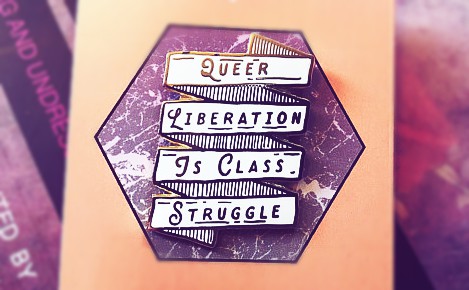
The Dead End of Anti-Assimilation
Anti-assimilation, in-so-much as it has been a critique of the bourgeois cooptation of movements for queer liberation, has been valuable. Anti-assimilation, in-so-much as it has been hostile to seeing queer struggles as part of the larger class struggle and as it has policed the identities of queers, by casting out queers who can pass, trans people who access medical transition, monogamous queers, queers who must be closeted in their working lives to retain employment, has been a hindrance. The assimilationist/anti-assimilationist dialectic is unhelpful. The proper questions we should ask ourselves about queer organizations, movements, and struggles are: What is the class composition? Are the forms of organization a benefit or a hindrance to working-class struggle? Are the goals ones that would strengthen the working class or the bourgeoisie? In which struggles will our efforts as revolutionaries be most valuable toward our ultimate goal of communism? We must also ask how we can broaden the struggle—what opportunities does each queer struggle bring to spread to the rest of the working class?
These are far more important questions to me than whether the queers participating in the struggle reach an appropriate level of anti-assimilationist purity, which often at its core is just a reflection of the stratification built into the working class, twisted on the surface, but true to that stratification at its core. Another problem with anti-assimilationist purity is, as mentioned earlier, the idea that there is a need for queers to discipline themselves to adhere to a hegemonic idea of queerness that stands in opposition to a hegemonic idea of straightness. We run into the danger of cutting out far more queers that we should desire to struggle alongside than those whom we do not wish to struggle alongside, our comrades being working-class queers who may be monogamous, vanilla, or gender-conforming, for instance.
Ultimately, we must remember that any movement that sees itself as divorced from class struggle, that does not incorporate an understanding of the logic of capital into its organization and goals, will go on to serve bourgeois ends as it will be easily cooptable, or be able to expand to other sectors of the working class, and allow itself to be resolved into demands that capital can easily meet without being weakened. The task of queer communists in relation to queer movements is to place themselves into mass organizations, arguing for working-class queer issues in straight-dominated organizations, and arguing for true anti-capitalist class analysis, direct action, and unmediated struggle in queer organizations. We cannot afford to seclude ourselves in a radical queer bubble, divorced from both radicalized straights and non-radicalized queers; nor can we afford to dilute our politics in united front–type politics. Instead, we see the need to form both specific political organizations with a great deal of unity, and to advocate for our revolutionary ideas in mass organizations.
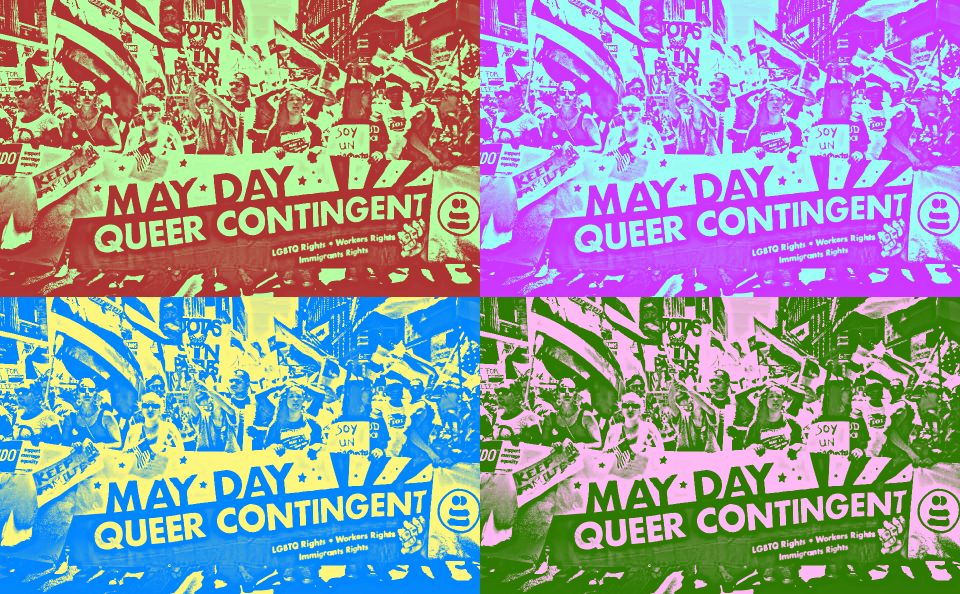
Questions to Be Asked
Of course, we are long from the days when any serious communist considers queerness to be a “bourgeois deviation.” However, while we have anarchist and Marxist feminisms to draw from, we are left with a queer theory that is totally divorced from class and transfeminisms without a solid class foundation, and a queer movement that has left behind its roots in the struggles of working-class queers. This leaves us with many questions that have yet to even be solidly asked.
On the theoretical level, we have questions regarding how queerness affects the conditions of productive and reproductive labor of working-class queers. Such questions as “what is it like to choose to not form the same sort of long-term romantic relationships in terms of how it impacts how one’s labor is exploited (harsher exploitation, less assistance in dealing with work, and loss of family support)? Or, when we do, when both partners are perceived as/are women, the assumption that neither is the primary breadwinner and thus how those lower wages and being thrown into a mothering role in the workplace brings that alienation to our social relationships? Or the extra unpaid reproductive labor (in the sense of reproducing one’s labor power for the next day) that is required for one to do when one lives in a world that is hostile to one’s very existence?” must be posed, analyzed, and hopefully provide guidance in our participation in struggles.
On a somewhat more practical level, we have such questions as “where are the potentials for broadened struggles that originate among working-class queers? How did the process of the queer movement losing its revolutionary character and acquiring a reactionary character occur? What forms of self-organization would serve us, as working-class queers?” While these questions may seem more pressing than the theoretical ones suggested previously, just as theory without practice is useless, practice without theory will forever leave us running every which way, and unable to identify the best places and moments for our energies. If we are to truly build a queer movement with a proletarian character, and return queer struggles to the proletarian struggle, we need both.
Conclusion
Queer anarchists are faced with a choice: do we stay with an analysis based on identity, and see our liberation as an independent entity? Or do we directly engage in class struggle with the rest of the working class, and see our liberation as inextricably linked with the liberation of all? One choice politically isolates us and can lead us to make alliances with the capital that exploits us and harms the self-organization of mass movements; the other has the potential to lead to true liberation, as divided we are weak, but, united, nothing in this world happens without the sweat on our brows.
This is to not say that queers can only take from class struggle, and give nothing in return. Many of us have been cast out of our families of origin, and can provide a lot of practical experience in creating new communities of mutual aid and solidarity. We provide our own unique viewpoints on the operation of oppression, and, by observing how it has created divisions in our own communities and disrupted our struggles for liberation, we can provide a lot of firsthand knowledge of how intersecting oppression and power imbalances can harm and derail the struggle of the proletariat. We have, in the past, mobilized large numbers of us when our community was threatened, acknowledging the power imbalances in our community, how portions of our community were disproportionately affected, and how the crisis went beyond our community. We came together to respond to the initial phases of the AIDS crisis and to directly struggle against the neglect of the state and the profiteering of corporations, but have subsequently, with the power and influence gained by bourgeois queers and their organizations, been told to turn our attention to inclusion in marriage and the military, against our own interests and abandoning those of us who are multiply marginalized. We can retake that power by identifying the ways queer members of the working class are affected by struggles around unions (and struggles toward workers’ organizations that are not merely the negotiating agent between labor and capital), housing, access to health care, the disproportionate effects of environmental destruction on the working class and oppressed groups, and against controls on immigration and toward a world without borders, in the form of nation-states and in the form of constraining, bordered, and policed identities. By identifying how queers are affected by these struggles, we can form bonds of true solidarity with other communities in these struggles, communities that many of us are already a part of. By building mass movements truly self-organized by the people in struggle themselves, and seeing how our issues are interconnected, we can bring about a serious challenge to capitalism and the state.
To me, someone who is committed to the end of all oppression, and the end of capitalism and the destruction of the bourgeois state, and the achievement of communism, a classless, stateless society, where production is according to our abilities and strictly for human needs, the choice is clear; as a queer communist, I must engage in class struggle and participate in the self-organization of the working class, as it is not enough for me, as a queer person to be in the same circumstances as a straight person in the same social position—nothing but social revolution will suffice. And the only way for that social revolution to occur and succeed is by struggling from our own material conditions, and broadening that struggle across sectors of the working class. The class struggle is the broadest and deepest struggle, reaching everywhere and getting to the root of things, and only through our selforganization can we truly be in solidarity with workers everywhere.
Author Recommended Readings and Resources
- “Queers Read This” by ACT UP NY
- “Refusing to Wait: Anarchism and Intersectionality” by Deric Shannon and J. Rogue
- Pink Is a Shade of Red Blog
- The author blogs at Autonomous Struggle of the Glittertariat
- One cannot hope to understand the capitalist mode of production without some familiarity with Marx; while there are several good books, lecture series, and/or blogs on reading Marx’s Capital, one should start with just reading, and, indeed, struggling through the first volume of Capital, without it being interpreted by someone else. Of these guides to Marx’s Capital, Harry Cleaver’s Reading Capital Politically is probably the best.
- Caliban and the Witch: Women, the Body, and Primitive Accumulation by Sylvia Federici, detailing the bloody birth of capitalism from feudalism, the beginning of a new patriarchal era, and how the process of primitive accumulation incorporated hierarchies of race and gender into the proletariat cannot be recommended enough.
- Libcom has an extensive library of what we might term libertarian communist writings—the work of anarcho-syndicalists, anarchist communists, left communists, autonomists, council communists, the ultra-left Marxist humanists, etc. that I highly recommend browsing, and in which one can find interesting and enlightening threads.
